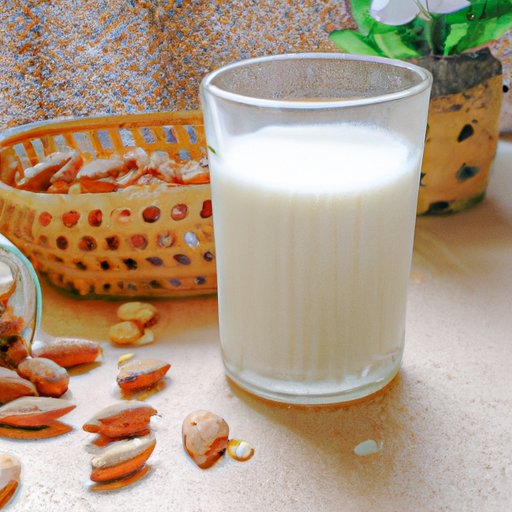Introduction
As veganism and plant-based diets become increasingly popular, many people are turning to alternative milks such as almond milk for their nutritional needs. But does almond milk have vitamin D? This article seeks to answer this question by exploring the nutritional profile of almond milk and comparing it to cow’s milk. We will also look at the potential health benefits of consuming vitamin D-rich almond milk.

Almond Milk: A Nutritional Analysis of Vitamin D Content
Before we can answer the question of whether almond milk has vitamin D, it is important to understand what vitamin D is and how it is beneficial to our health. Vitamin D is a fat-soluble vitamin that helps regulate calcium and phosphorus levels in the body, which are important for strong bones and teeth. It also plays an important role in supporting the immune system and helping the body absorb other essential vitamins and minerals.
Now, let’s take a look at the nutrition label for almond milk. Most brands of almond milk provide about one cup (240 ml) per serving and contain approximately 30 to 50 calories, 1.5 to 2 grams of fat, 1 gram of protein, 2 to 4 grams of carbohydrates, and 2 to 4 grams of sugar. Almond milk also contains various vitamins and minerals, including calcium, potassium, phosphorus, magnesium, and vitamins A, D, E, and B12.
So, does almond milk have vitamin D? The answer is yes. According to the nutrition label, most brands of almond milk contain 25 percent of the Daily Value (DV) of vitamin D per one-cup serving. While this is not a significant amount, it is still enough to provide some health benefits.
Exploring the Benefits of Almond Milk and Its Vitamin D Content
Now that we know that almond milk does indeed have vitamin D, let’s explore the potential health benefits of consuming this nutrient. Vitamin D is essential for bone health, as it helps the body absorb calcium, which is necessary for strong bones and teeth. Vitamin D is also important for maintaining a healthy immune system and can help protect against certain types of cancer. Additionally, research suggests that vitamin D may have a positive effect on mental health and may reduce the risk of depression.
In addition to its vitamin D content, almond milk also provides a variety of other nutrients. For example, almond milk contains calcium, which is important for bone health, as well as potassium, which helps regulate blood pressure. It is also a good source of vitamin E, which is an antioxidant that helps protect cells from damage. Furthermore, almond milk is low in calories and fat, making it a healthier alternative to cow’s milk for those who are trying to lose weight.
But is almond milk a good source of vitamin D? While almond milk does contain some vitamin D, it is not a significant source of the nutrient. The amount of vitamin D in almond milk is much lower than the amount found in cow’s milk, so if you are looking for a significant source of vitamin D, cow’s milk is the better option.
Comparing Vitamin D Levels in Almond Milk vs Cow’s Milk
To get a better understanding of the difference in vitamin D levels between almond and cow’s milk, let’s take a look at the nutrition labels of both products. One cup of cow’s milk contains 25 percent of the DV of vitamin D, while one cup of almond milk contains only 8 percent of the DV. This means that cow’s milk is a much better source of vitamin D than almond milk.
It is also important to note that cow’s milk is naturally enriched with vitamin D, meaning that it contains higher levels of the nutrient than almond milk without any added fortification. In addition, cow’s milk is a complete protein, meaning it contains all nine essential amino acids that the body needs for growth and development. Almond milk, on the other hand, is not a complete protein and does not contain all of the essential amino acids.

Almond Milk Nutrition: What You Need to Know About Vitamin D
When it comes to vitamin D, it is important to make sure that you are getting enough of the nutrient. The Recommended Dietary Allowance (RDA) for adults is 600 IU (International Units) per day. While almond milk does contain some vitamin D, it is not a significant source of the nutrient, so it is important to include other foods in your diet that are rich in vitamin D, such as fortified cereals, oily fish, eggs, and mushrooms.
It is also important to note that some people may need more vitamin D than others. Those at risk for vitamin D deficiency include those over the age of 70, pregnant women, and people with darker skin tones, as they may need more vitamin D to maintain optimal health. If you think you may be at risk for vitamin D deficiency, talk to your doctor about testing your levels and supplementing with vitamin D if needed.
Conclusion
To sum up, almond milk does contain some vitamin D, but it is not a significant source of the nutrient. While it is important to get enough vitamin D for overall health, it is best to include other sources of the nutrient in your diet, such as fortified cereals, oily fish, eggs, and mushrooms. However, almond milk does provide a variety of other essential vitamins and minerals, making it a nutritious choice for those following plant-based diets.
Overall, almond milk is a nutritious alternative to cow’s milk that can provide a variety of health benefits. While it does contain some vitamin D, it is not a significant source of the nutrient, so it is important to include other sources of the vitamin in your diet. By doing so, you can ensure that you are getting enough vitamin D for optimal health.


